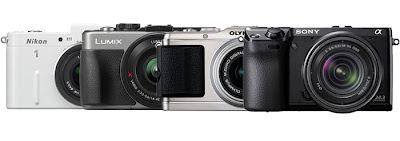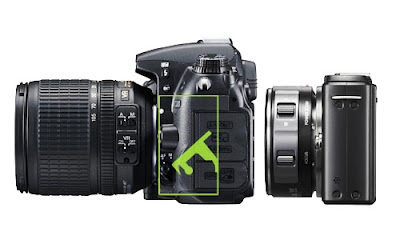Whether
you're looking for your first camera, itching for an upgrade or simply
curious, you'll find answers to your burning questions here: What is a
mirrorless system camera? Why are they called mirrorless systems? What
are the pros and cons of mirrorless system cameras? Is a mirrorless
camera for me? Read on to find out.
 |
| mirrorless camera |
What is a Mirrorless System Camera?
Let's start with the basics. In a nutshell, mirrorless system cameras are cameras which are in between DSLR and digital compact cameras.
Compared to compact cameras, they perform better, are more versatile
and larger. Compared with DSLR cameras, they're smaller and usually less
versatile but more user-friendly. Image quality is better than what
you'd get from a compact camera, and can be close to or even equal to
what you'd get from an entry-level DSLR camera. Technically, what
separates mirrorless system cameras from digital compact cameras are
their larger sensor sizes and the ability to swap lenses. What separates
mirrorless system cameras from DSLR cameras is the exclusion of a
mirror-box and in some cases, smaller sensor sizes. More on that below.
Why Are They Called 'Mirrorless System Cameras'?
Actually, there are a myriad of names for mirrorless system cameras, and nobody has really settled yet on a good one.
In 2008, when the first mirrorless camera was released, Panasonic and
Olympus called them mirrorless interchangeable-lens cameras (what a
mouthful!). You can imagine that didn't really take off. Other names
have also been proposed like Electronic Viewfinder with Interchangeable
Lens (EVIL) cameras. We're just going to go with the easy 'mirrorless
system cameras'.
The reason why they're called 'mirrorless' is because these cameras
remove the mirror found in traditional DSLR cameras. Because of that
they're able to reduce the camera's size while keeping a fairly large
image sensor. They're called 'system' cameras because of their ability
to swap lenses, giving you access to a wider eco-system of accessories.
To further the confusion, there's no one definitive mirrorless
system, rather there are many mirrorless systems in the market today,
seven at last count, with system names like Micro Four Thirds, NEX and
NX. We'll go into more detail on the different systems later.
 |
| Traditional DSLR cameras have a mirror box component, which is absent from mirrorless system cameras, hence the name 'mirrorless' and their smaller sizes (illustration not to scale). |
Should you get a mirrorless system camera? That depends on your goals and preferences for owning a digital camera.
Get a digital compact camera if you just want a simple to use, easy to carry and affordable camera for common everyday shots.
Get a mirrorless system camera if you want better
image quality than what you can get with digital compact cameras and you
don't mind a slightly chunky camera, but not one as chunky as a DSLR
camera. You also don't mind paying more than you would for a compact
camera, and you don't want a camera as complicated as a DSLR camera can
be. A mirrorless camera is also a good companion camera for the DSLR
owner who wants an easier to carry camera with manual controls.
Get a DSLR camera if you want great image quality
and don't mind carrying a larger and heavier camera. You also don't mind
the learning curve you'll need to go through in order to make full use
of the camera (although you can always leave it on 'Auto') and paying
more for a good camera. If you want to go deep into the craft of
photography and shoot more than everyday shots like wildlife, sports,
off-camera flash, long-exposures and more, then a DSLR camera is the
best option.
source
http://www.hardwarezone.com.sg/feature-everything-you-need-know-about-mirrorless-system-cameras
source
http://www.hardwarezone.com.sg/feature-everything-you-need-know-about-mirrorless-system-cameras


No comments:
Post a Comment